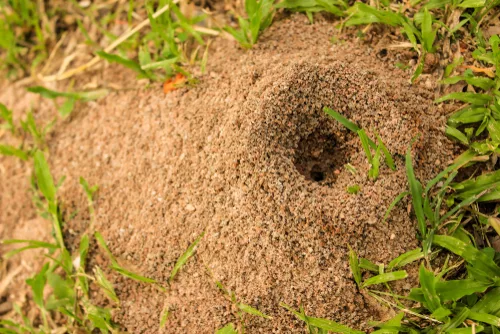Hoo boy! These critters are nothing to mess around with!
Fire ants might be little, but they make their presence painfully known if the occasion calls for it. They also reproduce quite quickly. Thus, upon discovering a fire ant infestation, getting rid of it should become your priority!
Here’s why and how to get rid of fire ants.
What Are Fire Ants?
Fire ants aren’t native to North America. They arrived from South America in the 1930s and have since spread to infest more than 260 million acres of land spanning 9 southeastern states, including Texas. Their rampage sometimes comes at the expense of native ant species and other wildlife, due in large part to their mating and protective habits.
A single colony of fire ants can produce thousands of queens, each with the potential to start her own colony. Queens mate with flying males and can travel distances either under their own steam or by hitching a ride on cars or trains. They can even float to new areas in flood waters.
Plus, queens only eat food that workers have eaten first. Thus, if an ant control poison works too rapidly, it will never make it to the queen.
What do fire ants look like? At between 1.5 and 5 millimeters long, fire ants are quite small — even for ants. Their bodies are bright red or reddish brown.
The Risks of Fire Ants
Fire ants are not the only red ants in Texas — so just seeing a red ant isn’t necessarily cause for alarm. However, if the red ant you see is a fire ant, watch out!
Fire ants will grab ahold of you with their powerful jaws in one-half less than no time. But that’s not the part to be concerned about. Once they get a good grip, they can insert their stinger and inject the burning venom they’re famous for.
One fire ant sting isn’t so bad. It’ll burn a little and itch and usually develop a little white pustule. If you treat it right, it probably won’t become infected. Fire ant bite treatment includes icing it to help with the burning and applying hydrocortisone cream and antibiotic ointment to keep the bite clean.
The bigger problem is that fire ants are aggressive and attack in droves. One ant can sting multiple times while his buddies are rushing to help — and there are more fire ants in one colony than you can shake a stick at! Enough stings can put people at risk of anaphylactic shock, particularly if the individual is allergic.
Beyond this irritation, fire ants are also dangerous to other animals. They will often eliminate competing insects when they move into an area. And their stings are powerful enough (in large numbers) to kill other animals — even baby livestock! The impact is so great that wildlife reproduction rates go up after area-wide fire ant suppression campaigns.
How to Get Rid of Fire Ants

In short, fire ants are about as welcome as an outhouse breeze. Once people spot them, they start reading up on fire ant killers to find out the fastest and most effective way to eliminate these pesky critters.
If you already have an infestation, the best plan of attack is to go to the source — the fire ant nest. Fire ants live in the ground, but the fire ant mound looks a little different. These ants don’t make exit holes in the top of the mound like other types of ants. Instead, they create subterranean tunnels and form mounds with the discarded dirt. You can spot their entrance tunnels in the flat areas surrounding the mound.
There are two main ways to get rid of fire ants with pesticides:
- Scatter slow-acting poison around the yard for foragers to pick up and take back to the nest.
- Drench the mound with either liquid or granular pesticides formulated specifically for fire ants.
To protect your home from future infestations you can use a broadcast treatment over your yard. For the best results, spread the treatment at the right time of year (late August to mid-October) and the right time of day (late afternoon when ants are foraging).
Protecting Your Home from Fire Ants
There’s no doubt about it, fire ants are not welcome critters. Not only do they pose a painful threat to your family members, but also to other wildlife who don’t take too kindly to them either.
But unlike wildlife, you can do something about it!
Call us friendly folks here at Buckaroo Pest Protection. We are committed to protecting your home from all threats —including the unnecessary use of poisonous chemicals. Fire ants are a real problem that we’ll help you take care of it in the healthiest way possible.
Reach out to us today to learn more!








